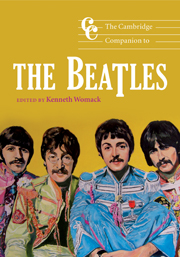Book contents
- Frontmatter
- Introducing the Beatles
- Part I Background
- Part II Works
- Part III History and influence
- 11 The Beatles as zeitgeist
- 12 Beatles news: product line extensions and the rock canon
- 13 “An abstraction, like Christmas”: the Beatles for sale and for keeps
- Notes
- Beatles discography, 1962–1970
- Select bibliography
- Index
11 - The Beatles as zeitgeist
from Part III - History and influence
Published online by Cambridge University Press: 28 September 2011
- Frontmatter
- Introducing the Beatles
- Part I Background
- Part II Works
- Part III History and influence
- 11 The Beatles as zeitgeist
- 12 Beatles news: product line extensions and the rock canon
- 13 “An abstraction, like Christmas”: the Beatles for sale and for keeps
- Notes
- Beatles discography, 1962–1970
- Select bibliography
- Index
Summary
The sixties and cultural politics
In July 2006, I was invited to take part in a day of national and regional press interviews. The topic was “The 60s: The Beatles Decade,” a five-part series by UKTV History which explored the influence of music on the 1960s. The series was accompanied by a survey which compared the experiences of those growing up in the sixties, seventies, and eighties, and revealed that over a third (34 percent of the 3,000 adults interviewed) conceded that at one time or another they have embroidered their past in order to gain the respect of their family and friends. A quarter of these claimed that they were flexible with the truth in order to appear “cool” to their children. Yet only 15 percent of those growing up in the seventies, and a mere 5 percent of those growing up in the eighties, admitted to lying about their past.
In particular, those growing up in the sixties were most likely to exaggerate their “beat generation” credentials – with a quarter claiming that they were a part of or had associations with the hippy movement, when in reality a mere 6 percent could really lay claim to this being true. One in five admitted lying about the drugs they had taken. Twenty-two percent of those questioned admitted that they had used the line, “I was too stoned to remember the sixties,” whereas in reality a mere 8 percent had tried cannabis and only 1 percent had tried acid.
- Type
- Chapter
- Information
- The Cambridge Companion to the Beatles , pp. 201 - 216Publisher: Cambridge University PressPrint publication year: 2009
- 1
- Cited by



